- Home
- Frank Herbert
The Heaven Makers Page 3
The Heaven Makers Read online
Page 3
A native killing its mate. He watched, and struggled to maintain his artistic distance. Subject female, appellation Murphey, a figure of staggering scarlet under artificial lights. The fog of all pretense scorched from her features by the unexpected alien who had been her husband. She submitted her life now to formidable auguries of which she’d had not the slightest hint. The weirds and shades of her ancestral gods no longer awakened mysteries in her mind. The doomfire faces of superstition had lost their accustomed places.
With an abrupt, violent motion, Fraffin blanked out the viewer, put his hands to his face. Death had come to the creature. The story would go on of itself now, under its own momentum. What a way to trap a Chem!
Fraffin lowered his hands to the smooth cold surface of his desk. But who was trapped?
He felt himself stretched suddenly upon a rack of vision, sensed a frightened multitude within him—the whisperings of his own past without beginning.
What were we—once? he wondered.
There lay the Chem curse: the infinite possessed no antiquities. Memory blurred off back there and one went to the artificial memory of records and reels with all their inaccuracies.
What was lost there? he wondered. Did we have damned prophets with the sickness of butchery on their tongues, their words casting out the salt of fate? What spiced fantasy might we uncover in our lost beginnings? We’ve gods of our own making. How did we make them? Do we spit now upon our own dust as we laugh at my foolish, pliable natives?
He could not deflect the sudden swarming of his own past—like hungry beasts glowing in a sky he’d beheld only once but which had terrorized him into flight. As quickly as it had come, the fear dissipated. But the experience left him shaken. He stared at one of his own hands. The hand trembled.
I need distracting entertainment, he thought. Gods of Preservation! Even boredom’s preferable to this!
Fraffin pushed himself away from his desk. How cold its edge felt against his hands! The room had become a foreign place, its devices alien, hateful. The soft curves of his massage couch, still shaped to his body, caught his attention on the right and he looked away quickly, repelled by his own body’s outline.
I must do something rational, he thought.
With a determined effort, he stood, made his way across the room to the steely convolutions of his pantovive reproducer. He slumped into its padded control seat, tuned the sensors directly to the planet surface. Satellite relays locked onto the machine’s probes and he searched out the daylight hemisphere, looked for activity there among his creatures—anything in which to bury his awareness.
Land swam through the viewer stage, a wash of checkerboard outlines in greens and yellows with here and there a chocolate brown. Highways… roads… the glittering amoeba shape of the city—he focused down into the streets and abruptly had a small crowd centered on the stage, the quarter-sized figures huddled like dolls at a corner. They were watching a pitchman, a weasel-faced little giant in a wrinkled gray suit and greasy hat. The native stood covertly alert behind a flimsy stand tray with transparent cover.
“Fleas!” the pitchman said and his voice carried that intimate imperative of the natural confidence man. “Yes, that’s what they are: fleas. But through an ancient and secret training method I make them perform fantastic acrobatics and marvelous tricks for you. See this pretty girl dance. And there’s a little woman who pulls a chariot. And this little girl leaps hurdles! They’ll wrestle and race and romp for you! Step right up. Only one lira to look through the magnifying viewers and see these marvels!”
Do those Fleas know they’re someone’s property? Fraffin wondered.
Chapter 4
For Dr. Androcles Thurlow, it began with a telephone ringing in the night.
Thurlow’s fumbling hand knocked the receiver to the floor. He spent a moment groping for it in the dark, still half asleep. His mind held trailing bits of a dream in which he relived the vivid moments just before the blast at the Lawrence Radiation lab which had injured his eyes. It was a familiar dream that had begun shortly after the accident three months ago, but he felt that it now contained a new significance which he’d have to examine professionally.
Psychologist, heal thyself, he thought.
The receiver gave off a tinny voice which helped him locate it. He pressed it to his ear.
“Hullo.” His voice carried a rasping sound in a dry mouth.
“Andy?”
He cleared his throat. “Yes?”
“This is Clint Mossman.”
Thurlow sat up, swung his feet out of the bed. The rug felt cold against his soles. The luminous dial of his bedside clock showed 2:18 a.m. The time and the fact that Mossman was the County’s chief criminal deputy sheriff could only mean an emergency. Mossman wanted Dr. Thurlow in his capacity as court psychologist.
“You there, Andy?”
“I’m here, Clint. What is it?”
“I’m afraid I have bad news, Andy. Your old girlfriend’s daddy just killed her mother.”
For a moment, the words made no sense. Old girlfriend. He had only one old girlfriend here, but she was now married to someone else.
“It’s Joe Murphey, Ruth Hudson’s daddy,” Mossman said.
“Oh, God,” Thurlow muttered.
“I haven’t much time,” Mossman said. “I’m calling from a pay phone across the street from Joe’s office building. He’s holed up in his office and he has a gun. He says he’ll only surrender to you.”
Thurlow shook his head. “He wants to see me?”
“We need you down here right away, Andy. I know this is a tough one for you—Ruth and all, but I’ve no choice. I want to prevent a gun battle…”
“I warned you people something like this was going to happen,” Thurlow said. He felt a sudden angry resentment against Mossman, the entire community of Moreno.
“I haven’t time to argue with you,” Mossman said. “I’ve told him you’re coming. It shouldn’t take more’n twenty minutes to get down here. Hurry it up, will you?”
“Sure, Clint. Right away.”
Thurlow put the receiver back on the phone. He prepared himself for the pain of light, turned on the bedside lamp. His eyes began to water immediately. He blinked rapidly, wondered if he’d ever again be able to experience sudden light without pain.
The realization of what Mossman had said began to grow. His mind felt numb. Ruth! Where is Ruth? But that wasn’t his concern any more. That was Nev Hudson’s problem. He began dressing, moving softly as he’d learned to do in the nights when his father was still alive.
He took his wallet from the nightstand, found his wristwatch and buckled it onto his left wrist. The glasses, then—the special polarizing glasses with their adjustable lenses. His eyes relaxed as soon as he put them on. The light took on a sharply defined yellow cast. He looked up, caught a view of himself in the mirror: thin face, the dark glasses behind heavy black rims, black crewcut hair high at the temples, nose long with a slight bulge below the glasses, wide mouth with slightly thicker lower lip, Lincolnesque chin, blue-shadowed and with divergent scar-like creases.
A drink was what he needed, but he knew he couldn’t take the time. Poor, sick Joe Murphey, he thought. God what a mess!
Chapter 5
Thurlow counted five sheriff’s cars drawn up at an angle to the curb in front of the Murphey Building as he pulled to a stop across the street. Spotlights drew patterns of erratic brilliance across the front of the three-story building and the blue and white sign above the entrance: “J.H. MURPHEY COMPANY—FINE COSMETICS.”
The lights reflected bursts of brilliance off the sign. The reflections speared Thurlow’s eyes. He slipped out on the curbside, searched for Mossman. Two furtive huddles of men crouched behind cars across the street.
Has Joe been shooting at them? Thurlow wondered.
He knew he was exposed to the dark windows of the building across there, but he felt none of the fragile loneliness he’d experienced in fire fights across th
e rice paddies of the war. He felt it was impossible that Ruth’s father could shoot at him. There’d been only one direction for the man to explode—and he’d already done that. Murphey was used up now, little more than a shell.
One of the officers across the street pushed a bullhorn around the rear of a car, shouted into it: “Joe! You, Joe Murphey! Dr. Thurlow’s here. Now you come down out of there and give yourself up. We don’t want to have to come in there shooting.”
The amplified voice boomed and echoed between the buildings. In spite of the amplifier’s distortions, Thurlow recognized Mossman’s voice.
A second floor window of the Murphey Building opened with a chilling screech. Spotlight circles darted across the stone facing, centered the movement. A man’s voice shouted from darkness behind the window: “No need to get rough, Clint, I see him over there. I’ll be down in seven minutes.” The window banged shut.
Thurlow ducked around his car, ran across to Mossman. The deputy was a bone thin man in a sack-like tan suit and pale cream sombrero. He turned to reveal a narrow face full of craggy shadows from the spotlights’ reflections.
“Hi, Andy,” he said. “Sorry about this, but you see how it is.”
“Has he been shooting?” Thurlow asked. He was surprised at the calmness of his own voice. Professional training, he thought. This was a psychotic crisis and he was trained to handle such matters.
“No, but he’s got a gun all right,” Mossman said. The deputy’s voice sounded weary and disgusted.
“You plan to give him his seven minutes?”
“Should we?”
“I think so. I think he’ll do exactly what he said he’ll do. He’ll come down and give himself up.”
“Seven minutes and no more then.”
“Did he say why he wanted to see me?”
“Something about Ruth and he’s afraid we’ll shoot him if you’re not here.”
“Is that what he said?”
“Yeah.”
“He’s living in a rather involved fantasy, that’s clear,” Thurlow said. “Perhaps I should go up and…”
“I’m afraid I can’t risk giving him a hostage.”
Thurlow sighed.
“You’re here,” Mossman said. That’s what he asked for. I’ll go along with…”
A radio speaker in the car beside them emitted a clanging sound, then: “Car nine.”
Mossman leaned into the car, put the microphone to his mouth, thumbed the button: “This is car nine, over.”
Thurlow looked around, recognized some of the officers sheltered behind the cars. He nodded to the ones who met his gaze, finding it odd how familiar and yet unfamiliar the men appeared, their faces dim in the polarized light which his lenses admitted. They were men he saw frequently in the, courthouse, men he knew by first name, but now they exposed a side he’d never before seen.
A metallic crackling came from Mossman’s radio, then: “Jack wants to know your ten-oh-eight, car nine. Over.”
Has Ruth heard yet? Thurlow wondered. Who’ll break this to her… and how?
“Murphey’s still up there in his office,” Mossman said. “Dr. Thurlow’s here now and Murphey says he’ll give himself up in seven minutes. We’re going to wait him out. Over.”
“Okay, car nine. Jack’s on his way with four more men. Sheriff’s still out at the house with the coroner. Sheriff says don’t take any chances. Use gas if you have to. Time is two forty-six; over.”
“Car nine is seven-oh-five,” Mossman said. “Over and out.” He hung the microphone in its rack, turned back to Thurlow. “What a sweet mess!” He pushed his cream sombrero back from his forehead.
“There’s no doubt he killed Adele?” Thurlow asked.
“No doubt.”
“Where?”
“At their house.”
“How?”
“Knife—that big souvenir thing he was always waving around at barbecues.”
Thurlow took a deep breath. It fitted the pattern, of course. A knife was the sickly logical weapon. He forced himself to professional calmness, asked: “When?”
“About midnight near as we can figure. Somebody called an ambulance but they didn’t think to notify us for almost half an hour. By the time we got on it Joe was gone.”
“So you came down here looking for him?”
“Something like that.”
Thurlow shook his head. As he moved, one of the spotlights shifted and he thought he saw an object hanging in the air outside Murphey’s window. He jerked his attention upward and the object appeared to flow backward up into the dark sky. Thurlow removed his glasses, rubbed his eyes. Strange thing—it had looked like a long tube. An aftereffect from the injury to his eyes, he thought. He replaced the glasses, returned his attention to Mossman.
“What’s Joe doing in there?” Thurlow asked. “Any idea?”
“Calling people on the telephone, bragging about what he’s done. His secretary, Nella Hartnick, had to be taken to the hospital in hysterics.”
“Has he called… Ruth?”
“Dunno.”
Thurlow thought about Ruth then, really focused on her for the first time since she’d sent back his ring with the polite little note (so unlike her, that note) telling of her marriage to Nev Hudson. Thurlow had been in Denver on the fellowship grant that had come to him through the National Science Foundation.
What a fool I was, he thought. That grant wasn’t worth losing Ruth.
He wondered if he should call her, try to break this news to her as gently as possible. But he knew there was no gentle way to break this news. It had to be done swiftly, cruel and sharp. A clean wound that would heal with as small a scar as possible… under the circumstances.
Moreno being the small town it was, he knew Ruth had kept her job after her marriage—night shift psychiatric nurse at the County Hospital. She’d be at the hospital now. A telephone call would be too impersonal, he knew. It’d have to be done in person.
And I’d be irrevocably associated with the tragedy, he thought. I don’t want that.
Thurlow realized then that he was daydreaming, trying to hold onto something of what he and Ruth had known together. He sighed. Let someone else break the news to her. She was someone else’s responsibility now.
An officer on Thurlow’s right said: “Think he’s drunk?”
“Is he ever sober?” Mossman asked.
The first officer asked: “You see the body?”
“No,” Mossman said, “but Jack described it when he called me.”
“Just gi’me one good shot at the sonofabitch,” the first officer muttered.
And now it starts, Thurlow thought.
He turned as a car pulled to a screeching stop across the street. Out of it jumped a short fat man, his pants pulled over pajamas. The man carried a camera with strobe light.
Thurlow whirled away from the light as the man crouched and aimed the camera. The strobe light flared in the canyon of the street… and again.
Expecting the glare, Thurlow had looked up at the sky to avoid the reflected light and its pain on his injured eyes. As the strobe flashed, he saw the strange object once more. It was hanging in the air about ten feet out from Murphey’s window. Even after the flare of light, the thing remained visible as a dim shape, almost cloudlike.
Thurlow stared, entranced. This couldn’t be an illusion or aftereffect of the eye injury. The shape was quite definite, real. It appeared to be a cylinder about twenty feet long and four or five feet in diameter. A semicircular shelf like a Ubangi lip projected from the end nearest the building. Two figures crouched on the lip. They appeared to be aiming a small stand-mounted tube at Murphey’s window. The figures were indistinct in the fog-like outline, but they appeared human—two arms, two legs—although small: perhaps only three feet tall.
Thurlow felt an odd sense of detached excitement at the vision. He knew he was seeing something real whose strangeness defied explanation. As he stared, one of the figures turned, looked full at him
. Thurlow saw the glow of eyes through the cloud-blurring. The figure nudged its companion. Now, both of them peered down at Thurlow—two pairs of glowing eyes.
Is it some form of mirage? he wondered.
Thurlow tried to swallow in a dry throat. A mirage could be seen by anyone. Mossman, standing beside him, was staring up at Murphey’s window. The deputy couldn’t help but see that odd cylinder hovering there—or the vision of it—but he gave no sign.
The photographer came panting up to them. Thurlow knew the man: Tom Lee from the Sentinel.
“Is Murphey still in there?” Lee asked.
“That’s right,” Mossman said.
“Hi, Dr. Thurlow,” Lee said. “What you staring at? Is that the window where Murphey’s holed up?”
Thurlow grabbed Lee’s shoulder. The two creatures on the cylinder had returned to their tube and were aiming it down toward the crowd of officers. Thurlow pointed toward them, aware of a strong musky smell of cologne from the photographer.
“Tom, what the devil is that up there?” Thurlow asked. “Get a picture of it.”
Lee turned with his camera, looked up. “What? Picture of what?”
“That thing outside Murphey’s window.”
“What thing?”
“Don’t you see something hovering just out from that window?”
“A bunch of gnats, maybe. Lots of ’em this year. They always collect like that where there’s light.”
“What light?” Thurlow asked.
“Huh? Well…”
Thurlow yanked off his polarized glasses. The cloud-like cylinder disappeared. In its place was a vague, foggy shape with tiny movements in it. He could see the corner of the building through it. He replaced the glasses. Again, there was a cylinder with two figures on a lip projecting from it. The figures were now pointing their tube toward the building’s entrance.
“There he comes!” It was a shout from their left.
Lee almost knocked Thurlow down pushing past Mossman to aim the camera at the building’s entrance. Officers surged forward.

 Direct Descent
Direct Descent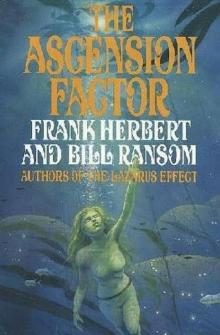 The Ascension Factor
The Ascension Factor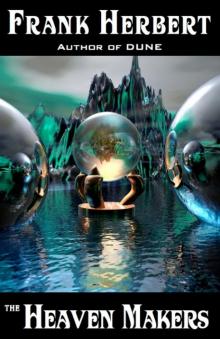 The Heaven Makers
The Heaven Makers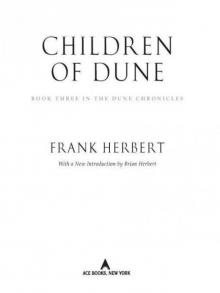 Children of Dune
Children of Dune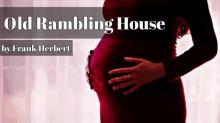 Old Rambling House
Old Rambling House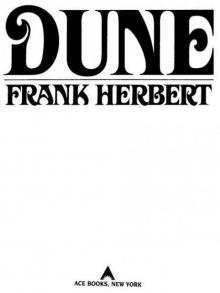 Dune
Dune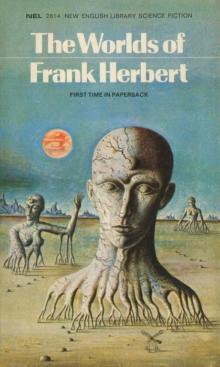 The Worlds of Frank Herbert
The Worlds of Frank Herbert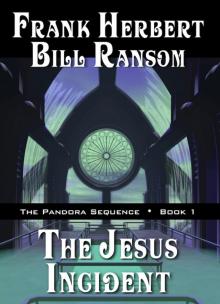 The Jesus Incident
The Jesus Incident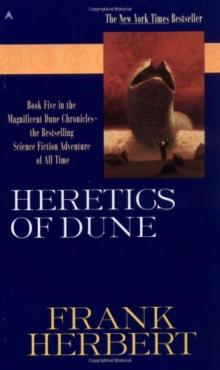 Heretics of Dune
Heretics of Dune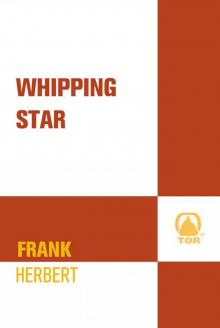 Whipping Star
Whipping Star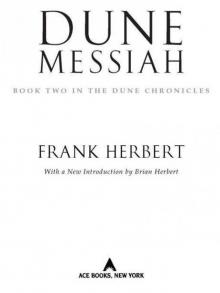 Dune Messiah
Dune Messiah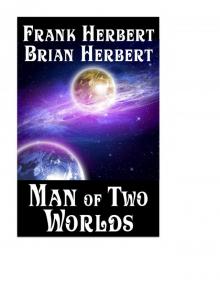 Man of Two Worlds
Man of Two Worlds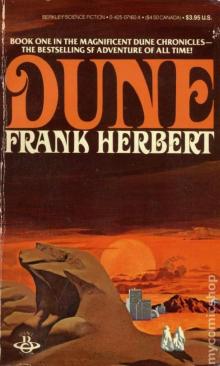 The Book of Frank Herbert
The Book of Frank Herbert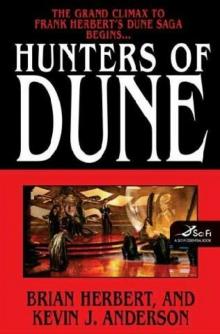 Hunters Of Dune
Hunters Of Dune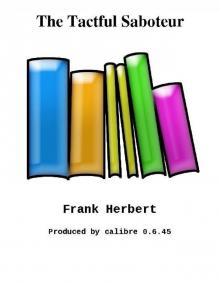 The Tactful Saboteur
The Tactful Saboteur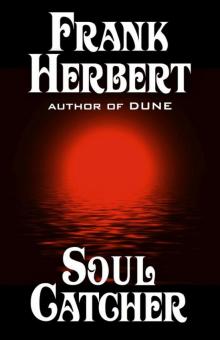 Soul Catcher
Soul Catcher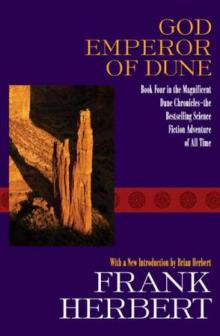 God Emperor of Dune
God Emperor of Dune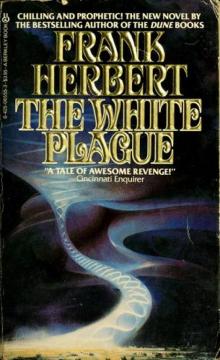 The White Plague
The White Plague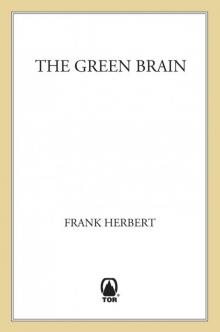 The Green Brain
The Green Brain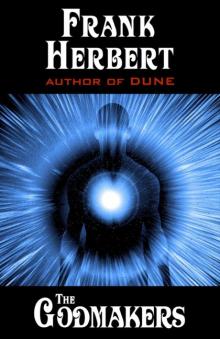 The Godmakers
The Godmakers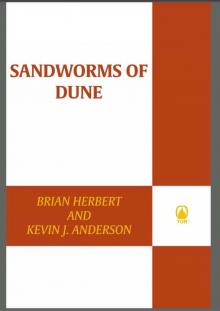 Sandworms of Dune
Sandworms of Dune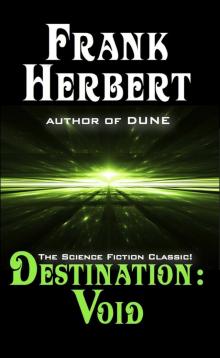 Destination Void
Destination Void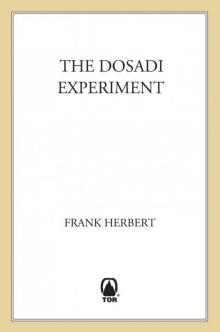 The Dosadi Experiment
The Dosadi Experiment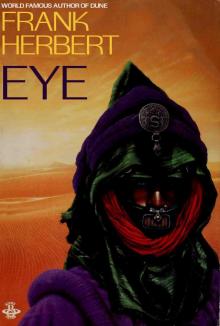 Eye
Eye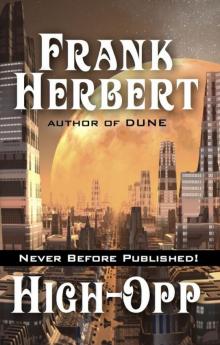 High-Opp
High-Opp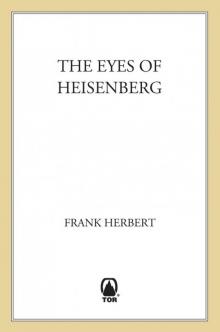 The Eyes of Heisenberg
The Eyes of Heisenberg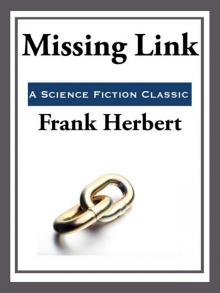 Missing Link
Missing Link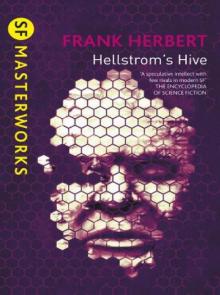 Hellstrom's Hive
Hellstrom's Hive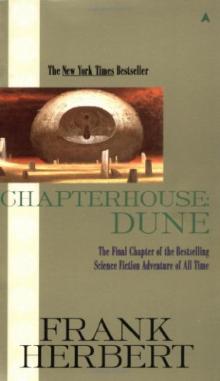 Chapterhouse: Dune
Chapterhouse: Dune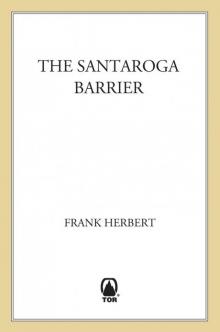 The Santaroga Barrier
The Santaroga Barrier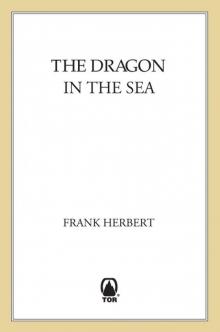 The Dragon in the Sea
The Dragon in the Sea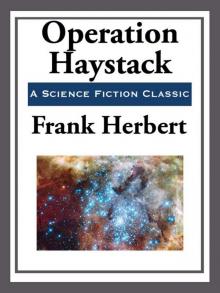 Operation Haystack
Operation Haystack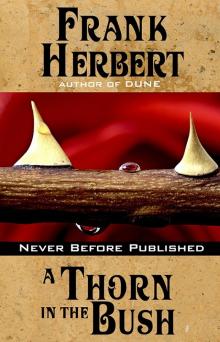 A Thorn in the Bush
A Thorn in the Bush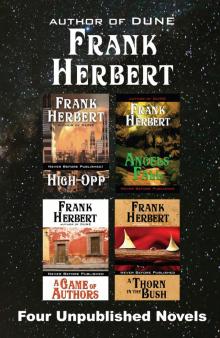 Four Unpublished Novels
Four Unpublished Novels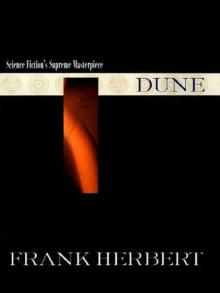 Dune dc-1
Dune dc-1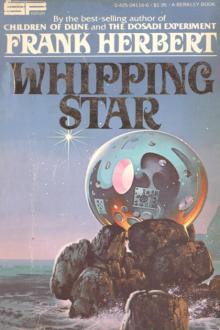 Jorj X. McKie 1 - Whipping Star
Jorj X. McKie 1 - Whipping Star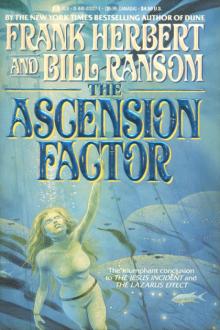 DV 4 - The Ascension Factor
DV 4 - The Ascension Factor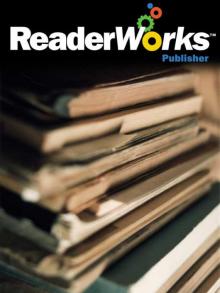 Frank Herbert - Dune Book 4 - God Emperor Of Dune
Frank Herbert - Dune Book 4 - God Emperor Of Dune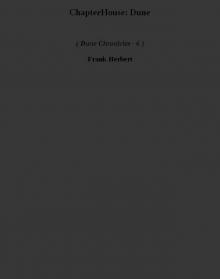 ChapterHouse: Dune dc-6
ChapterHouse: Dune dc-6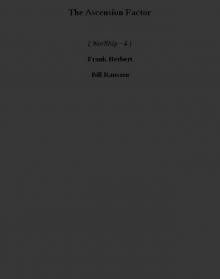 The Ascension Factor w-4
The Ascension Factor w-4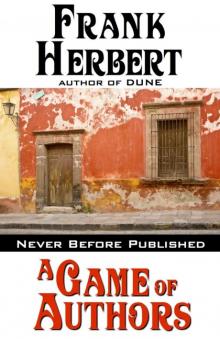 A Game of Authors
A Game of Authors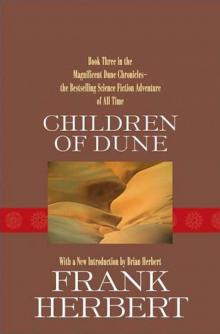 Children of Dune dc-3
Children of Dune dc-3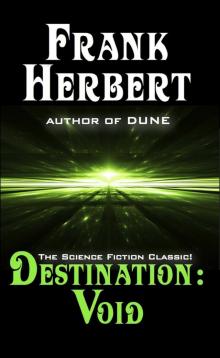 Destination: Void: Prequel to the Pandora Sequence
Destination: Void: Prequel to the Pandora Sequence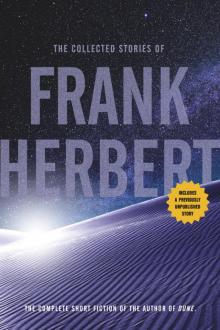 The Collected Stories of Frank Herbert
The Collected Stories of Frank Herbert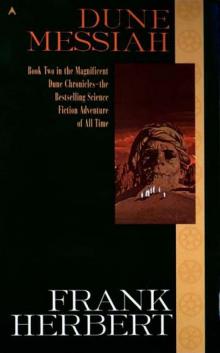 Dune Messiah dc-2
Dune Messiah dc-2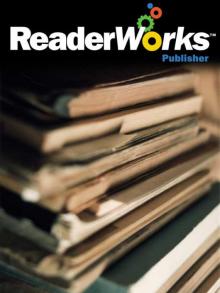 Frank Herbert - Dune Book 5 - Heretics of Dune
Frank Herbert - Dune Book 5 - Heretics of Dune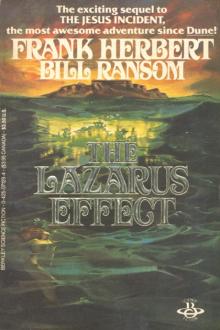 DV 3 - The Lazarus Effect
DV 3 - The Lazarus Effect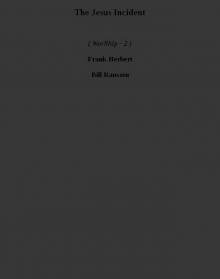 The Jesus Incident w-2
The Jesus Incident w-2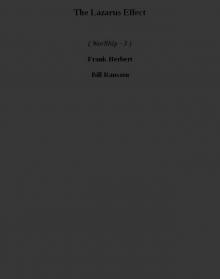 The Lazarus Effect w-3
The Lazarus Effect w-3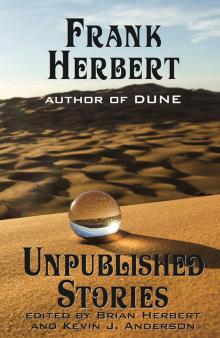 Frank Herbert
Frank Herbert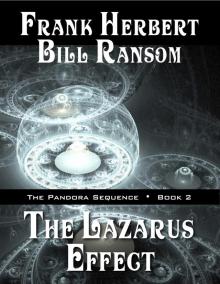 The Ascension Factor: Pandora Sequence
The Ascension Factor: Pandora Sequence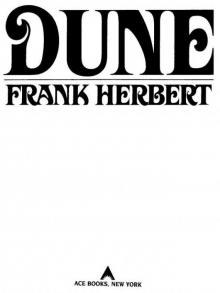 Dune (40th Anniversary Edition)
Dune (40th Anniversary Edition)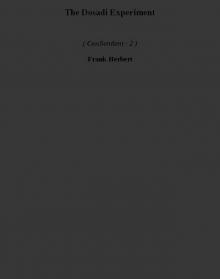 The Dosadi Experiment c-2
The Dosadi Experiment c-2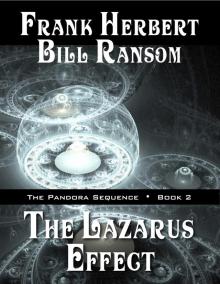 The Lazarus Effect
The Lazarus Effect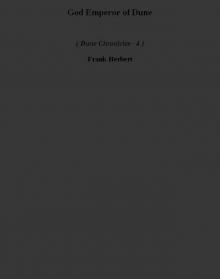 God Emperor of Dune dc-4
God Emperor of Dune dc-4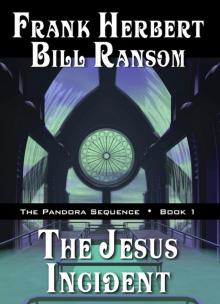 The Pandora Sequence: The Jesus Incident, the Lazarus Effect, the Ascension Factor
The Pandora Sequence: The Jesus Incident, the Lazarus Effect, the Ascension Factor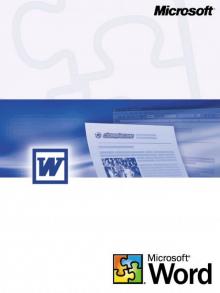 The Green Brain (v4.0)
The Green Brain (v4.0)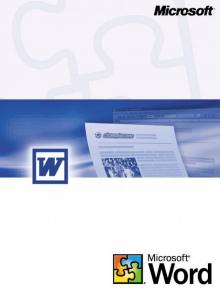 The Heaven Makers (v4.0)
The Heaven Makers (v4.0)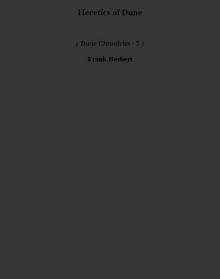 Heretics of Dune dc-5
Heretics of Dune dc-5